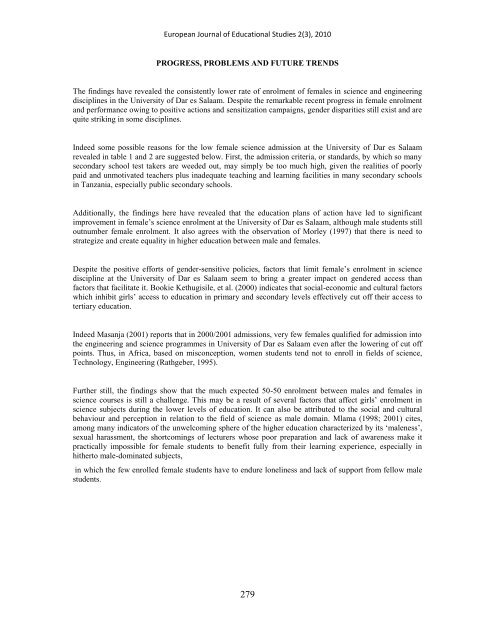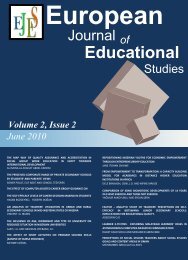women access to science at the university of dar es salaam - Ozean ...
women access to science at the university of dar es salaam - Ozean ...
women access to science at the university of dar es salaam - Ozean ...
You also want an ePaper? Increase the reach of your titles
YUMPU automatically turns print PDFs into web optimized ePapers that Google loves.
European Journal <strong>of</strong> Educ<strong>at</strong>ional Studi<strong>es</strong> 2(3), 2010PROGRESS, PROBLEMS AND FUTURE TRENDSThe findings have revealed <strong>the</strong> consistently lower r<strong>at</strong>e <strong>of</strong> enrolment <strong>of</strong> femal<strong>es</strong> in <strong>science</strong> and engineeringdisciplin<strong>es</strong> in <strong>the</strong> University <strong>of</strong> Dar <strong>es</strong> Salaam. D<strong>es</strong>pite <strong>the</strong> remarkable recent progr<strong>es</strong>s in female enrolmentand performance owing <strong>to</strong> positive actions and sensitiz<strong>at</strong>ion campaigns, gender dispariti<strong>es</strong> still exist and arequite striking in some disciplin<strong>es</strong>.Indeed some possible reasons for <strong>the</strong> low female <strong>science</strong> admission <strong>at</strong> <strong>the</strong> University <strong>of</strong> Dar <strong>es</strong> Salaamrevealed in table 1 and 2 are sugg<strong>es</strong>ted below. First, <strong>the</strong> admission criteria, or stan<strong>dar</strong>ds, by which so manysecon<strong>dar</strong>y school t<strong>es</strong>t takers are weeded out, may simply be <strong>to</strong>o much high, given <strong>the</strong> realiti<strong>es</strong> <strong>of</strong> poorlypaid and unmotiv<strong>at</strong>ed teachers plus inadequ<strong>at</strong>e teaching and learning faciliti<strong>es</strong> in many secon<strong>dar</strong>y schoolsin Tanzania, <strong>es</strong>pecially public secon<strong>dar</strong>y schools.Additionally, <strong>the</strong> findings here have revealed th<strong>at</strong> <strong>the</strong> educ<strong>at</strong>ion plans <strong>of</strong> action have led <strong>to</strong> significantimprovement in female‟s <strong>science</strong> enrolment <strong>at</strong> <strong>the</strong> University <strong>of</strong> Dar <strong>es</strong> Salaam, although male students stilloutnumber female enrolment. It also agre<strong>es</strong> with <strong>the</strong> observ<strong>at</strong>ion <strong>of</strong> Morley (1997) th<strong>at</strong> <strong>the</strong>re is need <strong>to</strong>str<strong>at</strong>egize and cre<strong>at</strong>e equality in higher educ<strong>at</strong>ion between male and femal<strong>es</strong>.D<strong>es</strong>pite <strong>the</strong> positive efforts <strong>of</strong> gender-sensitive polici<strong>es</strong>, fac<strong>to</strong>rs th<strong>at</strong> limit female‟s enrolment in <strong>science</strong>discipline <strong>at</strong> <strong>the</strong> University <strong>of</strong> Dar <strong>es</strong> Salaam seem <strong>to</strong> bring a gre<strong>at</strong>er impact on gendered <strong>acc<strong>es</strong>s</strong> thanfac<strong>to</strong>rs th<strong>at</strong> facilit<strong>at</strong>e it. Bookie Kethugisile, et al. (2000) indic<strong>at</strong><strong>es</strong> th<strong>at</strong> social-economic and cultural fac<strong>to</strong>rswhich inhibit girls‟ <strong>acc<strong>es</strong>s</strong> <strong>to</strong> educ<strong>at</strong>ion in primary and secon<strong>dar</strong>y levels effectively cut <strong>of</strong>f <strong>the</strong>ir <strong>acc<strong>es</strong>s</strong> <strong>to</strong>tertiary educ<strong>at</strong>ion.Indeed Masanja (2001) reports th<strong>at</strong> in 2000/2001 admissions, very few femal<strong>es</strong> qualified for admission in<strong>to</strong><strong>the</strong> engineering and <strong>science</strong> programm<strong>es</strong> in University <strong>of</strong> Dar <strong>es</strong> Salaam even after <strong>the</strong> lowering <strong>of</strong> cut <strong>of</strong>fpoints. Thus, in Africa, based on misconception, <strong>women</strong> students tend not <strong>to</strong> enroll in fields <strong>of</strong> <strong>science</strong>,Technology, Engineering (R<strong>at</strong>hgeber, 1995).Fur<strong>the</strong>r still, <strong>the</strong> findings show th<strong>at</strong> <strong>the</strong> much expected 50-50 enrolment between mal<strong>es</strong> and femal<strong>es</strong> in<strong>science</strong> cours<strong>es</strong> is still a challenge. This may be a r<strong>es</strong>ult <strong>of</strong> several fac<strong>to</strong>rs th<strong>at</strong> affect girls‟ enrolment in<strong>science</strong> subjects during <strong>the</strong> lower levels <strong>of</strong> educ<strong>at</strong>ion. It can also be <strong>at</strong>tributed <strong>to</strong> <strong>the</strong> social and culturalbehaviour and perception in rel<strong>at</strong>ion <strong>to</strong> <strong>the</strong> field <strong>of</strong> <strong>science</strong> as male domain. Mlama (1998; 2001) cit<strong>es</strong>,among many indica<strong>to</strong>rs <strong>of</strong> <strong>the</strong> unwelcoming sphere <strong>of</strong> <strong>the</strong> higher educ<strong>at</strong>ion characterized by its „malen<strong>es</strong>s‟,sexual harassment, <strong>the</strong> shortcomings <strong>of</strong> lecturers whose poor prepar<strong>at</strong>ion and lack <strong>of</strong> awaren<strong>es</strong>s make itpractically impossible for female students <strong>to</strong> benefit fully from <strong>the</strong>ir learning experience, <strong>es</strong>pecially inhi<strong>the</strong>r<strong>to</strong> male-domin<strong>at</strong>ed subjects,in which <strong>the</strong> few enrolled female students have <strong>to</strong> endure lonelin<strong>es</strong>s and lack <strong>of</strong> support from fellow mal<strong>es</strong>tudents.279
















